Dépannage de CRL pour l'authentification basée sur certificat AnyConnect
Options de téléchargement
-
ePub (949.4 KB)
Consulter à l’aide de différentes applications sur iPhone, iPad, Android ou Windows Phone -
Mobi (Kindle) (708.6 KB)
Consulter sur un appareil Kindle ou à l’aide d’une application Kindle sur plusieurs appareils
Langage exempt de préjugés
Dans le cadre de la documentation associée à ce produit, nous nous efforçons d’utiliser un langage exempt de préjugés. Dans cet ensemble de documents, le langage exempt de discrimination renvoie à une langue qui exclut la discrimination en fonction de l’âge, des handicaps, du genre, de l’appartenance raciale de l’identité ethnique, de l’orientation sexuelle, de la situation socio-économique et de l’intersectionnalité. Des exceptions peuvent s’appliquer dans les documents si le langage est codé en dur dans les interfaces utilisateurs du produit logiciel, si le langage utilisé est basé sur la documentation RFP ou si le langage utilisé provient d’un produit tiers référencé. Découvrez comment Cisco utilise le langage inclusif.
À propos de cette traduction
Cisco a traduit ce document en traduction automatisée vérifiée par une personne dans le cadre d’un service mondial permettant à nos utilisateurs d’obtenir le contenu d’assistance dans leur propre langue. Il convient cependant de noter que même la meilleure traduction automatisée ne sera pas aussi précise que celle fournie par un traducteur professionnel.
Table des matières
Introduction
Ce document décrit comment dépanner la liste de révocation de certificats (CRL) configurée pour l'authentification basée sur les certificats AnyConnect.
Conditions préalables
Exigences
Cisco vous recommande de prendre connaissance des rubriques suivantes :
- Autorité de certification (CA)
- Infrastructures à clé publique (PKI)
- VPN RA sur FTD
- Windows 10 avec client AnyConnect
Composants utilisés
Les informations contenues dans ce document sont basées sur les versions de logiciel suivantes :
- CSR1000V - Cisco IOS® XE, version 16.12.03 - en tant que serveur Cisco IOS XE CA
- NGFWv - Version 7.1.0 - comme passerelle VPN
- AnyConnect Secure Mobility Client version 4.10.07073 - en tant que client VPN
- Windows 10 en tant qu'ordinateur local
The information in this document was created from the devices in a specific lab environment. All of the devices used in this document started with a cleared (default) configuration. Si votre réseau est en ligne, assurez-vous de bien comprendre l’incidence possible des commandes.
Informations générales
La liste de révocation de certificats permet aux périphériques de déterminer si un certificat a été révoqué avant l'expiration de sa durée de vie. Une liste de révocation de certificats contient le numéro de série et la date de révocation du certificat. Une passerelle sécurisée telle que les systèmes Firepower Thread Defense (FTD) ou d'autres périphériques finaux utilise cette fonctionnalité afin de renforcer l'authentification du certificat en validant l'état du certificat.
Topologie
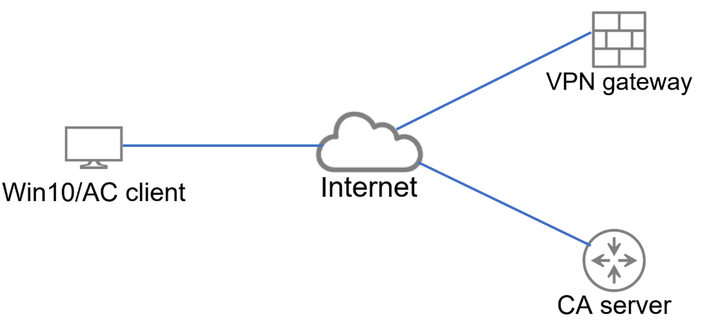 Topologie de base qui fournit la connectivité à la passerelle VPN et au serveur AC.
Topologie de base qui fournit la connectivité à la passerelle VPN et au serveur AC.
Configuration importante
Afin d'accomplir l'authentification basée sur certificat avec CRL, la configuration présentée a été utilisée dans chacun des périphériques impliqués.
Routeur CA
L'autorité de certification du serveur est chargée de délivrer des certificats d'identité aux utilisateurs afin de fournir une authentification par rapport à la passerelle VPN. En outre, le routeur stocke le fichier de base de données CRL et agit en tant que point de distribution CRL (CDP).
Un CDP est l'emplacement où la passerelle VPN et d'autres utilisateurs finaux récupèrent les informations CRL. Ces informations sont mises en cache localement et ne sont valides que pendant une période spécifique ; lorsque cette période expire, une nouvelle liste de révocation de certificats est téléchargée.

Remarque : la base de données CRL et l'emplacement où les périphériques ont accès à la liste CRL peuvent se trouver sur le même périphérique. Toutefois, pour des raisons de sécurité, il est recommandé que la liste de révocation de certificats à laquelle les périphériques finaux ont accès soit stockée dans un autre périphérique que la base de données de la liste de révocation de certificats. Dans cet exemple, le routeur AC stocke la base de données CRL et agit en tant que CDP pour la passerelle VPN.
crypto pki server CAS
database level complete
no database archive
issuer-name cn=calo_root,ou=TAC,o=cisco
grant auto
hash sha256
lifetime crl 2
lifetime certificate 300
lifetime ca-certificate 1000
cdp-url http://192.0.2.10/cgi-bin/pkiclient.exe?operation=GetCRL
eku server-auth client-auth
database url ser nvram:
crypto pki trustpoint TP-self-signed-1507329386
enrollment selfsigned
subject-name cn=IOS-Self-Signed-Certificate-1507329386
revocation-check none
rsakeypair TP-self-signed-1507329386
crypto pki trustpoint CAS
revocation-check crl
rsakeypair CAS
interface GigabitEthernet2
ip address 192.0.2.10 255.255.255.0
negotiation auto
ip http server
ntp master 1
Configuration de la passerelle VPN
Le FTD est configuré afin de fournir un VPN d'accès à distance aux utilisateurs finaux en utilisant des certificats comme méthode d'authentification (certificat uniquement). À la réception du certificat d'identité de l'utilisateur, le FTD vérifie si le certificat a été émis par une autorité de certification (CA) connue et confirme sa validité en obtenant la liste de révocation de certificats du CDP défini dans le certificat.
tunnel-group local type remote-access
tunnel-group local general-attributes
address-pool AC_pool
default-group-policy local_gp
username-from-certificate use-entire-name
tunnel-group local_test webvpn-attributes
authentication certificate
group-alias test enable
Périphérique Windows
Un certificat d'identité a été émis par le serveur AC et installé sur le périphérique Windows.
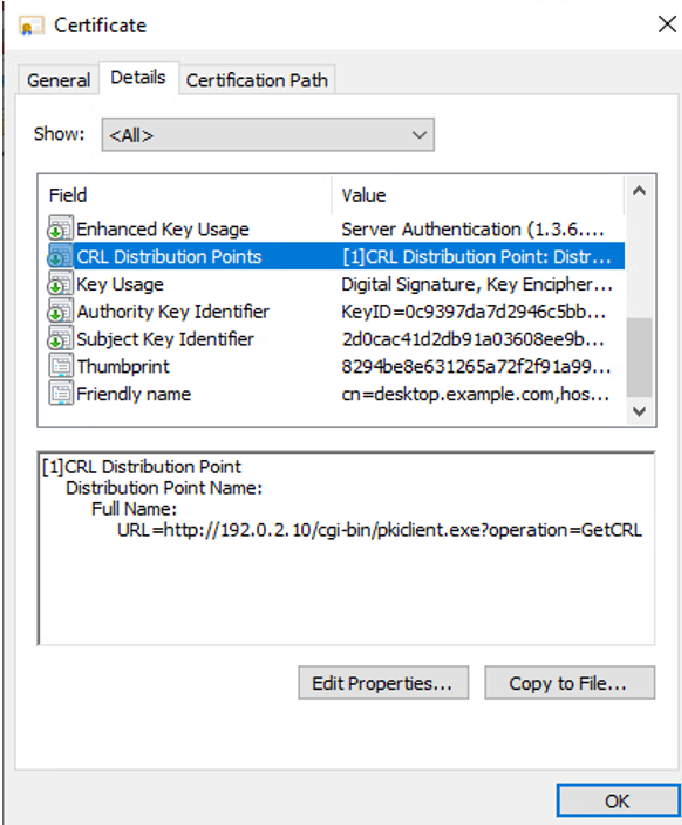
Validation
Les débogages et captures suivants affichent la différence entre un utilisateur utilisant un certificat valide (scénario de travail) et un utilisateur utilisant un certificat qui a été révoqué (scénario de non-travail).
Scénario 1. Le certificat est valide pour l'authentification
Lorsque l'utilisateur lance la tentative de connexion, il fournit au FTD son certificat d'identité, la passerelle VPN vérifie que l'émetteur est une autorité connue et commence à demander la liste de révocation de certificats à partir du CDP défini dans le certificat d'identité via une requête HTTP/GET. Le serveur AC répond avec la liste de révocation de certificats et le FTD vérifie si le numéro de série du certificat est répertorié. Comme la liste de révocation de certificats est vide (aucun certificat révoqué), le FTD accepte le certificat comme valide et permet à l'utilisateur de s'authentifier.
PKI[7]: Cert to verify
PKI[7]: ---------Certificate--------:
Serial Number: 2 (0x2)
Issuer: O=cisco, OU=TAC, CN=calo_root
Subject: CN=desktop.example.com/unstructuredName=CA-router
PKI[12]: pki_verify_cb, pki_ossl_validate.c:358
PKI[8]: val status=1: cert subject: /O=cisco/OU=TAC/CN=calo_root. ctx->error: (0)ok, cert_idx: 1
PKI[12]: pki_verify_cb, pki_ossl_validate.c:358
PKI[8]: val status=1: cert subject: /CN=desktop.example.com/unstructuredName=CA-router. ctx->error: (0)ok, cert_idx: 0
PKI[8]: pki_ossl_find_valid_chain took 217 microsecs
PKI[6]: Verified chain:
PKI[14]: pki_ossl_get_cert_summary, pki_ossl.c:119
PKI[6]: ---------Certificate--------:
Serial Number: 2 (0x2)
Issuer: O=cisco, OU=TAC, CN=calo_root
Subject: CN=desktop.example.com/unstructuredName=CA-router
PKI[14]: pki_ossl_get_cert_summary, pki_ossl.c:119
PKI[6]: ---------Certificate--------:
Serial Number: 1 (0x1)
Issuer: O=cisco, OU=TAC, CN=calo_root
Subject: O=cisco, OU=TAC, CN=calo_root
[..output ommitted]
CRYPTO_PKI: bitValue of KEY_USAGE = a0PKI[7]: CRYPTO_PKI:check_key_usage: Checking KU for case VPN peer certs.
PKI[7]: CRYPTO_PKI:check_key_usage: KU bit digitalSignature is ON.
PKI[7]: ExtendedKeyUsage OID = serverAuth NOT acceptable for usage type SSL VPN Peer
PKI[7]: ExtendedKeyUsage OID = clientAuth acceptable for usage type: SSL VPN Peer
PKI[7]: check_key_usage:Extended Key/Key Usage check OK
PKI[12]: pki_ossl_revocation_check, pki_ossl_validate.c:931
PKI[7]: Starting revocation check for session 0x06c8d45f
PKI[12]: pki_init_revocation, pki_ossl_revocation.c:162
PKI[12]: pki_ossl_eval_revocation, pki_ossl_validate.c:699
PKI[7]: Evaluating session revocation status, 1 certs to check
PKI[8]: session 0x06c8d45f, cert 0 has rev_status 0, using methods 1/3/0 at index 0
PKI[12]: cert_revoc_exempt, pki_ossl_revocation.c:250
PKI[13]: get_tp_from_policy, pki_ossl_policy_transition.c:230
PKI[11]: polinfo->name: CRL-AC
PKI[11]: tp label: Trustpool
PKI[13]: label: CRL-AC
PKI[13]: pki_crl_cached, pki_ossl_crl_cache.c:1351
PKI[13]: get_tp_from_policy, pki_ossl_policy_transition.c:230
PKI[11]: polinfo->name: CRL-AC
PKI[11]: tp label: Trustpool
PKI[13]: label: CRL-AC
PKI[12]: pki_ossl_check_cache, pki_ossl_crl_cache.c:1269
PKI[7]: Starting OSSL CRL cache check.
PKI[12]: pki_ossl_crypto_build_crldp_list, pki_ossl_crl_cache.c:326
PKI[12]: pki_get_der_cdp_ext, crypto_pki.c:1528
PKI[14]: url_type_allowed, pki_ossl_crl_cache.c:153
PKI[9]: Attempting to find cached CRL for CDP http://192.0.2.10/cgi-bin/pkiclient.exe?operation=GetCRL
PKI[12]: pki_ossl_SelectCRLByIssuerTimeDER, pki_ossl_crl_cache.c:1219
PKI[14]: pki_ossl_get_name_string, pki_ossl.c:315
PKI[9]: Select DER crl(O=cisco, OU=TAC, CN=calo_root)
PKI[12]: pki_ossl_get_crl_internal, pki_ossl_crl_cache.c:506
PKI[7]: CRL not cached. Initiating CRL download for cert idx 0.
PKI[12]: do_get_crl, pki_ossl_revocation.c:85
PKI[9]: starting CRL FSM #0
PKI[11]: drive_fsm, pki_ossl_revocation.c:33
PKI[8]: [Sess: 0x06c8d45f, Cert: 0] FSM: In PKICRL_InitTransaction
PKI[12]: get_cdps, pki_crl_fsm_act.c:202
PKI[13]: get_tp_from_policy, pki_ossl_policy_transition.c:230
PKI[11]: polinfo->name: CRL-AC
PKI[11]: tp label: Trustpool
PKI[13]: label: CRL-AC
PKI[12]: pki_ossl_crypto_build_crldp_list, pki_ossl_crl_cache.c:326
PKI[12]: pki_get_der_cdp_ext, crypto_pki.c:1528
PKI[14]: url_type_allowed, pki_ossl_crl_cache.c:153
PKI[7]: cdp: (len=58, type=URI, prot=HTTP) http://192.0.2.10/cgi-bin/pkiclient.exe?operation=GetCRL
PKI[8]: [Sess: 0x06c8d45f, Cert: 0] FSM: PKICRL_InitTransaction, Return status: 0
PKI[8]: [Sess: 0x06c8d45f, Cert: 0] FSM: In PKICRL_NextCDP
PKI[12]: crldl_cdp_blacklisted, pki_ossl_crl.c:1374
PKI[12]: crl_find_pending_crl, pki_ossl_crl.c:1155
PKI[13]: get_pending_crl_list, pki_ossl_crl.c:1101
PKI[13]: crypto_pki_get_ossl_env, pki_ossl.c:42
PKI[14]: cmp_cdp_info, pki_ossl_crl.c:1121
PKI[14]: cmp_cdp_info, pki_ossl_crl.c:1121
PKI[14]: cmp_cdp_info, pki_ossl_crl.c:1121
PKI[7]: CDP is not blacklisted
PKI[8]: [Sess: 0x06c8d45f, Cert: 0] FSM: PKICRL_NextCDP, Return status: 0
PKI[8]: [Sess: 0x06c8d45f, Cert: 0] FSM: In PKICRL_Request
PKI[13]: crldp_download_pending, pki_ossl_crl.c:1184
PKI[12]: crl_find_pending_crl, pki_ossl_crl.c:1155
PKI[13]: get_pending_crl_list, pki_ossl_crl.c:1101
PKI[13]: crypto_pki_get_ossl_env, pki_ossl.c:42
PKI[14]: cmp_cdp_info, pki_ossl_crl.c:1121
PKI[14]: cmp_cdp_info, pki_ossl_crl.c:1121
PKI[14]: cmp_cdp_info, pki_ossl_crl.c:1121
PKI[8]: session 0x06c8d45f adding pending CRL entry for cert 0
PKI[12]: crldp_add_pending_download, pki_ossl_crl.c:1203
PKI[12]: crl_find_pending_crl, pki_ossl_crl.c:1155
PKI[13]: get_pending_crl_list, pki_ossl_crl.c:1101
PKI[13]: crypto_pki_get_ossl_env, pki_ossl.c:42
PKI[14]: cmp_cdp_info, pki_ossl_crl.c:1121
PKI[14]: cmp_cdp_info, pki_ossl_crl.c:1121
PKI[14]: cmp_cdp_info, pki_ossl_crl.c:1121
PKI[13]: get_pending_crl_list, pki_ossl_crl.c:1101
PKI[13]: crypto_pki_get_ossl_env, pki_ossl.c:42
PKI[12]: retrieve_crl, pki_crl_fsm_act.c:233
PKI[13]: get_tp_from_policy, pki_ossl_policy_transition.c:230
PKI[11]: polinfo->name: CRL-AC
PKI[11]: tp label: Trustpool
PKI[13]: label: CRL-AC
PKI[7]: CDP type HTTP
PKI[7]: getting http://192.0.2.10/cgi-bin/pkiclient.exe?operation=GetCRL
PKI[12]: pki_ossl_crl_build_http_io, pki_ossl_crl.c:1017
PKI[13]: pki_parse_uri, pki_ossl_uri.c:75
PKI[14]: pki_uri_map_protocol, pki_ossl_uri.c:17
PKI[14]: pki_uri_get_port, pki_ossl_uri.c:34
PKI[13]: pki_free_uri, pki_ossl_uri.c:57
PKI[11]: pki_crl_request_send_async, pki_ossl_crl.c:627
PKI[8]: [15] IOCB allocated
PKI[7]: PKI CRL I/O request queue result: IO_STATUS_QUEUED
PKI[8]: [Sess: 0x06c8d45f, Cert: 0] FSM: PKICRL_Request, Return status: 0
PKI[7]: Chain revocation status: good: 0, exempt: 0, cached: 0, revoked: 0, error: 0, pending: 1, fail-allow: 0
PKI[9]: Async unlocked for session 0x06c8d45f
PKI[8]: [15] Received IO request msg
PKI[8]: [15] DNS resolve issued for 192.0.2.10
PKI[9]: CERT API thread sleeps!
PKI[7]: [15] DNS resolve 192.0.2.10 (192.0.2.10)
PKI[8]: [15] Socket open success
PKI[8]: [15] IPv4 Route lookup to 192.0.2.10 use interface outside
PKI[8]: [15] Connect sent to 192.0.2.10 from 192.0.2.1
PKI[12]: pki_io_cbfunc_log_revocation_check, pki_ossl_revocation.c:421
PKI[7]: 6717056: Attempting CRL revocation check from outside:192.0.2.1/62075 to 192.0.2.10/80 using HTTP.
PKI[8]: [15] Received Socket transmit ready msg
----- Begin Data Type:HTTP Request [15]
Length: 76 -----
47 45 54 20 2f 63 67 69 2d 62 69 6e 2f 70 6b 69 | GET /cgi-bin/pki
63 6c 69 65 6e 74 2e 65 78 65 3f 6f 70 65 72 61 | client.exe?opera
74 69 6f 6e 3d 47 65 74 43 52 4c 20 48 54 54 50 | tion=GetCRL HTTP
2f 31 2e 30 0d 0a 48 6f192.0.2.10 73 74 3a 20 31 39 32 2e | /1.0..Host: 192.
31 38 31 2e 33 2e 31 30 0d 0a 0d 0a | 0.2.10....
----- End Data Type:HTTP Request [15]
Length: 76 -----
PKI[8]: [15] Sent 76 bytes
PKI[8]: [15] Received Socket read ready msg
PKI[8]: [15] read 662 bytes
PKI[8]: [15] Read EOF
PKI[12]: pki_io_cbfunc, pki_crl_fsm_act.c:59
PKI[7]: Callback received for vcid: 0, sess_id: 0x06c8d45f, cert_idx: 0, status: IO_STATUS_OK(1), datalen: 662
PKI[13]: get_fsm_data, pki_ossl_revocation.c:446
PKI[7]: [15] IOCB freed
PKI[13]: CERT_API_QueueFSMEvent, vpn3k_cert_api.c:137
PKI[13]: CERT_API_req_enqueue, vpn3k_cert_api.c:2913
PKI[9]: CERT API thread wakes up!
PKI[12]: CERT_API_Q_Process, vpn3k_cert_api.c:2811
PKI[12]: CERT_API_process_req_msg, vpn3k_cert_api.c:2746
PKI[8]: process msg cmd=2, session=0x06c8d45f
PKI[9]: Async locked for session 0x06c8d45f
PKI[11]: pki_notify_fsm_evt, pki_ossl_revocation.c:56
PKI[11]: drive_fsm, pki_ossl_revocation.c:33
PKI[8]: [Sess: 0x06c8d45f, Cert: 0] FSM: In PKICRL_ProcessResp
PKI[13]: pki_ossl_util_find_http_payload, pki_ossl_utils.c:36
PKI[8]: Received CRL of length 249 for session 0x06c8d45f, cert idx 0
PKI[13]: get_tp_from_policy, pki_ossl_policy_transition.c:230
PKI[11]: polinfo->name: CRL-AC
PKI[11]: tp label: Trustpool
PKI[13]: label: CRL-AC
PKI[12]: pki_ossl_crl_add_to_cache, pki_ossl_crl_cache.c:1177
PKI[12]: pki_ossl_crypto_verify_and_insert_crl, pki_ossl_crl_cache.c:1126
PKI[12]: pki_ossl_insert_der_crl_int, pki_ossl_crl_cache.c:1017
PKI[8]: Inserting CRL
PKI[14]: pki_ossl_get_crl_summary, pki_ossl.c:151
PKI[8]: ---------CRL--------:
Certificate Revocation List (CRL):
Version 1 (0x0)
Signature Algorithm: sha1WithRSAEncryption
Issuer: /O=cisco/OU=TAC/CN=calo_root
Last Update: Sep 24 22:18:38 2023 GMT
Next Update: Sep 25 00:18:38 2023 GMT
No Revoked Certificates.
[..outout ommitted]
PKI[7]: Evaluating session revocation status, 1 certs to check
PKI[8]: session 0x06c8d45f, cert 0 has rev_status 3, using methods 1/3/0 at index 0
PKI[7]: Chain revocation status: good: 0, exempt: 0, cached: 1, revoked: 0, error: 0, pending: 0, fail-allow: 0
PKI[7]: session: 0x06c8d45f, all revocation processing complete
PKI[5]: session: 0x06c8d45f, CRL for certificate 0 has been cached
PKI[12]: pki_ossl_rebuild_ca_store, pki_ossl_certstore.c:194
PKI[13]: crypto_pki_get_ossl_env, pki_ossl.c:42
PKI[12]: pki_ossl_crl_add_cache_to_store, pki_ossl_crl_cache.c:1396
PKI[9]: OSSL certstore updated with 0 certs, 1 CRLs and 0 policies, 0 certs added to stack
PKI[7]: session 0x06c8d45f, Starting chain validation with cached CRL checking
PKI[12]: pki_ossl_find_valid_chain, pki_ossl_validate.c:472
PKI[9]: Begin sorted cert chain
PKI[14]: pki_ossl_get_cert_summary, pki_ossl.c:119
PKI[9]: ---------Certificate--------:
Serial Number: 1 (0x1)
Issuer: O=cisco, OU=TAC, CN=calo_root
Subject: O=cisco, OU=TAC, CN=calo_root
PKI[14]: pki_ossl_get_cert_summary, pki_ossl.c:119
PKI[9]: ---------Certificate--------:
Serial Number: 2 (0x2)
Issuer: O=cisco, OU=TAC, CN=calo_root
Subject: CN=desktop.example.com/unstructuredName=CA-router
PKI[9]: End sorted cert chain
PKI[13]: pki_ossl_get_store, pki_ossl_certstore.c:61
PKI[12]: pki_ossl_rebuild_ca_store, pki_ossl_certstore.c:194
PKI[13]: crypto_pki_get_ossl_env, pki_ossl.c:42
PKI[13]: crypto_pki_get_ossl_env, pki_ossl.c:42
PKI[14]: pki_ossl_get_cert_summary, pki_ossl.c:119
PKI[9]: Cert to verify
PKI[9]: ---------Certificate--------:
Serial Number: 2 (0x2)
Issuer: O=cisco, OU=TAC, CN=calo_root
Subject: CN=desktop.example.com/unstructuredName=CA-router
PKI[12]: pki_verify_cb, pki_ossl_validate.c:358
PKI[8]: val status=1: cert subject: /O=cisco/OU=TAC/CN=calo_root. ctx->error: (0)ok, cert_idx: 1
PKI[12]: pki_verify_cb, pki_ossl_validate.c:358
PKI[8]: val status=1: cert subject: /CN=desktop.example.com/unstructuredName=CA-router. ctx->error: (0)ok, cert_idx: 0
PKI[8]: pki_ossl_find_valid_chain took 167 microsecs
PKI[7]: session 0x06c8d45f, Validation with CRL checking completed, status 0
PKI[7]: session 0x06c8d45f, Revocation check complete, no revoked certs found
PKI[12]: pki_ossl_do_callback, pki_ossl_validate.c:164
PKI[13]: CERT_Close, vpn3k_cert_api.c:291
PKI[8]: Close session 0x06c8d45f asynchronously
PKI[13]: CERT_API_req_enqueue, vpn3k_cert_api.c:2913
PKI[9]: Async unlocked for session 0x06c8d45f
PKI[8]: No IOCB found for SOCKET CLOSE message, handle 0x5dba666
PKI[12]: CERT_API_Q_Process, vpn3k_cert_api.c:2811
PKI[12]: CERT_API_process_req_msg, vpn3k_cert_api.c:2746
PKI[8]: process msg cmd=1, session=0x06c8d45f
PKI[9]: Async locked for session 0x06c8d45f
PKI[9]: Async unlocked for session 0x06c8d45f
PKI[13]: pki_ossl_free_valctx, pki_ossl_validate.c:251
PKI[13]: free_fsm_data, pki_ossl_revocation.c:225
PKI[13]: ocsp_free_fsmdata, pki_ossl_ocsp.c:1462
PKI[13]: free_fsm_data, pki_ossl_revocation.c:225
PKI[13]: ocsp_free_fsmdata, pki_ossl_ocsp.c:1462
PKI[9]: CERT API thread sleeps!
PKI[13]: CERT_GetGroupFromSSLRule, vpn3k_cert_api.c:1672
La capture FTD suivante affiche la transaction HTTP entre le FTD et le CDP (serveur AC dans ce cas) afin de récupérer la liste de révocation de certificats.
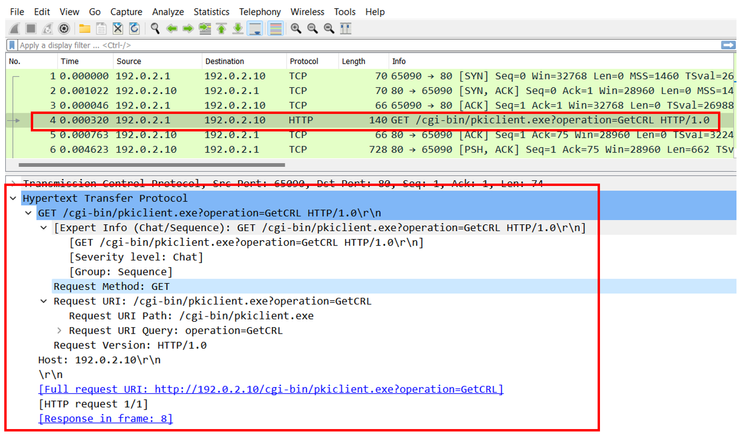
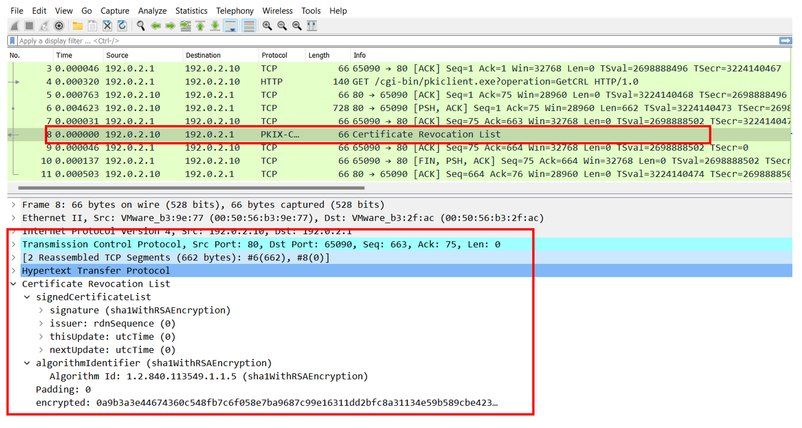
Scénario 2. Le certificat est révoqué et l'authentification échoue
Un certificat d'identité est révoqué sur le serveur AC et enregistré dans le fichier de base de données CRL. Cependant, la liste de révocation de certificats mise à jour n'est pas disponible pour le FTD tant que la liste de révocation de certificats actuelle n'expire pas (configurée pour être valide pendant deux heures).
CA-router#show crypto pki server CAS crl
Certificate Revocation List:
Issuer: cn=calo_root,ou=TAC,o=cisco
This Update: 22:18:38 UTC Sep 24 2023
Next Update: 00:18:38 UTC Sep 25 2023
Number of CRL entries: 0
CRL size: 249 bytes
CA-router#show crypto pki server CAS certificates
Serial Issued date Expire date Subject Name
1 20:18:36 UTC Sep 24 2023 20:18:36 UTC Jun 20 2026 cn=calo_root ou=TAC o=cisco
2 20:19:33 UTC Sep 24 2023 20:19:33 UTC Jul 20 2024 hostname=CA-router cn=desktop.example.com
3 23:50:58 UTC Sep 24 2023 23:50:58 UTC Jul 20 2024 cn=test.cisco.com
CA-router#crypto pki server CAS revoke 0x2
% Certificate 02 succesfully revoked.
CA-router#show crypto pki server CAS crl
Certificate Revocation List:
Issuer: cn=calo_root,ou=TAC,o=cisco
This Update: 23:59:32 UTC Sep 24 2023
Next Update: 01:59:32 UTC Sep 25 2023
Number of CRL entries: 1
CRL size: 272 bytes
Revoked Certificates:
Serial Number (hex): 02
Revocation Date: 23:59:32 UTC Sep 24 2023
Lors d'une nouvelle tentative de connexion après la confirmation de l'expiration de la liste de révocation de certificats, l'inspection de certificat est généralement identique au scénario précédent. La nouvelle liste de révocation de certificats est demandée une fois que le FTD a confirmé l'absence de liste de révocation de certificats dans le cache. À la réception de la nouvelle liste de révocation de certificats, le FTD vérifie si le numéro de série du certificat d’identité fait partie de la liste. Le numéro de série est marqué comme révoqué et le FTD continue à refuser l'accès à l'utilisateur.
CRYPTO_PKI: bitValue of KEY_USAGE = a0PKI[7]: CRYPTO_PKI:check_key_usage: Checking KU for case VPN peer certs.
PKI[7]: CRYPTO_PKI:check_key_usage: KU bit digitalSignature is ON.
PKI[7]: ExtendedKeyUsage OID = serverAuth NOT acceptable for usage type SSL VPN Peer
PKI[7]: ExtendedKeyUsage OID = clientAuth acceptable for usage type: SSL VPN Peer
PKI[7]: check_key_usage:Extended Key/Key Usage check OK
PKI[12]: pki_ossl_revocation_check, pki_ossl_validate.c:931
PKI[7]: Starting revocation check for session 0x0dc288f9
PKI[12]: pki_init_revocation, pki_ossl_revocation.c:162
PKI[12]: pki_ossl_eval_revocation, pki_ossl_validate.c:699
PKI[7]: Evaluating session revocation status, 1 certs to check
PKI[8]: session 0x0dc288f9, cert 0 has rev_status 0, using methods 1/3/0 at index 0
PKI[12]: cert_revoc_exempt, pki_ossl_revocation.c:250
PKI[13]: get_tp_from_policy, pki_ossl_policy_transition.c:230
PKI[11]: polinfo->name: CRL-AC
PKI[11]: tp label: Trustpool
PKI[13]: label: CRL-AC
PKI[13]: pki_crl_cached, pki_ossl_crl_cache.c:1351
PKI[13]: get_tp_from_policy, pki_ossl_policy_transition.c:230
PKI[11]: polinfo->name: CRL-AC
PKI[11]: tp label: Trustpool
PKI[13]: label: CRL-AC
PKI[12]: pki_ossl_check_cache, pki_ossl_crl_cache.c:1269
PKI[7]: Starting OSSL CRL cache check.
PKI[12]: pki_ossl_crypto_build_crldp_list, pki_ossl_crl_cache.c:326
PKI[12]: pki_get_der_cdp_ext, crypto_pki.c:1528
PKI[14]: url_type_allowed, pki_ossl_crl_cache.c:153
PKI[9]: Attempting to find cached CRL for CDP http://192.0.2.10/cgi-bin/pkiclient.exe?operation=GetCRL
PKI[12]: pki_ossl_SelectCRLByIssuerTimeDER, pki_ossl_crl_cache.c:1219
PKI[14]: pki_ossl_get_name_string, pki_ossl.c:315
PKI[9]: Select DER crl(O=cisco, OU=TAC, CN=calo_root)
PKI[12]: pki_ossl_get_crl_internal, pki_ossl_crl_cache.c:506
PKI[7]: CRL not cached. Initiating CRL download for cert idx 0.
PKI[12]: do_get_crl, pki_ossl_revocation.c:85
PKI[9]: starting CRL FSM #0
PKI[11]: drive_fsm, pki_ossl_revocation.c:33
PKI[8]: [Sess: 0x0dc288f9, Cert: 0] FSM: In PKICRL_InitTransaction
PKI[12]: get_cdps, pki_crl_fsm_act.c:202
PKI[13]: get_tp_from_policy, pki_ossl_policy_transition.c:230
PKI[11]: polinfo->name: CRL-AC
PKI[11]: tp label: Trustpool
PKI[13]: label: CRL-AC
PKI[12]: pki_ossl_crypto_build_crldp_list, pki_ossl_crl_cache.c:326
PKI[12]: pki_get_der_cdp_ext, crypto_pki.c:1528
PKI[14]: url_type_allowed, pki_ossl_crl_cache.c:153
PKI[7]: cdp: (len=58, type=URI, prot=HTTP) http://192.0.2.10/cgi-bin/pkiclient.exe?operation=GetCRL
PKI[8]: [Sess: 0x0dc288f9, Cert: 0] FSM: PKICRL_InitTransaction, Return status: 0
PKI[8]: [Sess: 0x0dc288f9, Cert: 0] FSM: In PKICRL_NextCDP
PKI[12]: crldl_cdp_blacklisted, pki_ossl_crl.c:1374
PKI[12]: crl_find_pending_crl, pki_ossl_crl.c:1155
PKI[13]: get_pending_crl_list, pki_ossl_crl.c:1101
PKI[13]: crypto_pki_get_ossl_env, pki_ossl.c:42
PKI[14]: cmp_cdp_info, pki_ossl_crl.c:1121
PKI[14]: cmp_cdp_info, pki_ossl_crl.c:1121
PKI[14]: cmp_cdp_info, pki_ossl_crl.c:1121
PKI[7]: CDP is not blacklisted
PKI[8]: [Sess: 0x0dc288f9, Cert: 0] FSM: PKICRL_NextCDP, Return status: 0
PKI[8]: [Sess: 0x0dc288f9, Cert: 0] FSM: In PKICRL_Request
PKI[13]: crldp_download_pending, pki_ossl_crl.c:1184
PKI[12]: crl_find_pending_crl, pki_ossl_crl.c:1155
PKI[13]: get_pending_crl_list, pki_ossl_crl.c:1101
PKI[13]: crypto_pki_get_ossl_env, pki_ossl.c:42
PKI[14]: cmp_cdp_info, pki_ossl_crl.c:1121
PKI[14]: cmp_cdp_info, pki_ossl_crl.c:1121
PKI[14]: cmp_cdp_info, pki_ossl_crl.c:1121
PKI[8]: session 0x0dc288f9 adding pending CRL entry for cert 0
PKI[12]: crldp_add_pending_download, pki_ossl_crl.c:1203
PKI[12]: crl_find_pending_crl, pki_ossl_crl.c:1155
PKI[13]: get_pending_crl_list, pki_ossl_crl.c:1101
PKI[13]: crypto_pki_get_ossl_env, pki_ossl.c:42
PKI[14]: cmp_cdp_info, pki_ossl_crl.c:1121
PKI[14]: cmp_cdp_info, pki_ossl_crl.c:1121
PKI[14]: cmp_cdp_info, pki_ossl_crl.c:1121
PKI[13]: get_pending_crl_list, pki_ossl_crl.c:1101
PKI[13]: crypto_pki_get_ossl_env, pki_ossl.c:42
PKI[12]: retrieve_crl, pki_crl_fsm_act.c:233
PKI[13]: get_tp_from_policy, pki_ossl_policy_transition.c:230
PKI[11]: polinfo->name: CRL-AC
PKI[11]: tp label: Trustpool
PKI[13]: label: CRL-AC
PKI[7]: CDP type HTTP
PKI[7]: getting http://192.0.2.10/cgi-bin/pkiclient.exe?operation=GetCRL
PKI[12]: pki_ossl_crl_build_http_io, pki_ossl_crl.c:1017
PKI[13]: pki_parse_uri, pki_ossl_uri.c:75
PKI[14]: pki_uri_map_protocol, pki_ossl_uri.c:17
PKI[14]: pki_uri_get_port, pki_ossl_uri.c:34
PKI[13]: pki_free_uri, pki_ossl_uri.c:57
PKI[11]: pki_crl_request_send_async, pki_ossl_crl.c:627
PKI[8]: [16] IOCB allocated
PKI[7]: PKI CRL I/O request queue result: IO_STATUS_QUEUED
PKI[8]: [Sess: 0x0dc288f9, Cert: 0] FSM: PKICRL_Request, Return status: 0
PKI[7]: Chain revocation status: good: 0, exempt: 0, cached: 0, revoked: 0, error: 0, pending: 1, fail-allow: 0
PKI[9]: Async unlocked for session 0x0dc288f9
PKI[8]: [16] Received IO request msg
PKI[8]: [16] DNS resolve issued for 192.0.2.10
PKI[9]: CERT API thread sleeps!
PKI[7]: [16] DNS resolve 192.0.2.10 (192.0.2.10)
PKI[8]: [16] Socket open success
PKI[8]: [16] IPv4 Route lookup to 192.0.2.10 use interface outside
PKI[8]: [16] Connect sent to 192.0.2.10 from 192.0.2.1
PKI[12]: pki_io_cbfunc_log_revocation_check, pki_ossl_revocation.c:421
PKI[7]: 6717056: Attempting CRL revocation check from outside:192.0.2.1/27791 to 192.0.2.10/80 using HTTP.
PKI[8]: [16] Received Socket transmit ready msg
----- Begin Data Type:HTTP Request [16]
Length: 76 -----
47 45 54 20 2f 63 67 69 2d 62 69 6e 2f 70 6b 69 | GET /cgi-bin/pki
63 6c 69 65 6e 74 2e 65 78 65 3f 6f 70 65 72 61 | client.exe?opera
74 69 6f 6e 3d 47 65 74 43 52 4c 20 48 54 54 50 | tion=GetCRL HTTP
2f 31 2e 30 0d 0a 48 6f 73 74 3a 20 31 39 32 2e | /1.0..Host: 192.
31 38 31 2e 33 2e 31 30 0d 0a 0d 0a | 0.2.10....
----- End Data Type:HTTP Request [16]
Length: 76 -----
PKI[8]: [16] Sent 76 bytes
PKI[8]: [16] Received Socket read ready msg
PKI[8]: [16] read 685 bytes
PKI[8]: [16] Read EOF
PKI[12]: pki_io_cbfunc, pki_crl_fsm_act.c:59
PKI[7]: Callback received for vcid: 0, sess_id: 0x0dc288f9, cert_idx: 0, status: IO_STATUS_OK(1), datalen: 685
PKI[13]: get_fsm_data, pki_ossl_revocation.c:446
PKI[7]: [16] IOCB freed
PKI[13]: CERT_API_QueueFSMEvent, vpn3k_cert_api.c:137
PKI[13]: CERT_API_req_enqueue, vpn3k_cert_api.c:2913
PKI[9]: CERT API thread wakes up!
PKI[12]: CERT_API_Q_Process, vpn3k_cert_api.c:2811
PKI[12]: CERT_API_process_req_msg, vpn3k_cert_api.c:2746
PKI[8]: process msg cmd=2, session=0x0dc288f9
PKI[9]: Async locked for session 0x0dc288f9
PKI[11]: pki_notify_fsm_evt, pki_ossl_revocation.c:56
PKI[11]: drive_fsm, pki_ossl_revocation.c:33
PKI[8]: [Sess: 0x0dc288f9, Cert: 0] FSM: In PKICRL_ProcessResp
PKI[13]: pki_ossl_util_find_http_payload, pki_ossl_utils.c:36
PKI[8]: Received CRL of length 272 for session 0x0dc288f9, cert idx 0
PKI[13]: get_tp_from_policy, pki_ossl_policy_transition.c:230
PKI[11]: polinfo->name: CRL-AC
PKI[11]: tp label: Trustpool
PKI[13]: label: CRL-AC
PKI[12]: pki_ossl_crl_add_to_cache, pki_ossl_crl_cache.c:1177
PKI[12]: pki_ossl_crypto_verify_and_insert_crl, pki_ossl_crl_cache.c:1126
PKI[12]: pki_ossl_insert_der_crl_int, pki_ossl_crl_cache.c:1017
PKI[8]: Inserting CRL
PKI[14]: pki_ossl_get_crl_summary, pki_ossl.c:151
PKI[8]: ---------CRL--------:
Certificate Revocation List (CRL):
Version 1 (0x0)
Signature Algorithm: sha1WithRSAEncryption
Issuer: /O=cisco/OU=TAC/CN=calo_root
Last Update: Sep 25 00:18:09 2023 GMT
Next Update: Sep 25 02:18:09 2023 GMT
Number of Revoked Certificates: 1
PKI[12]: asn1_to_unix_time, crypto_pki.c:1735
PKI[12]: asn1_to_unix_time, crypto_pki.c:1735
PKI[12]: pki_ossl_crypto_certc_insert_CRL, pki_ossl_crl_cache.c:735
PKI[7]: CRL: current time is 1695601164
PKI[7]: CRL: nextupdate time is 1695608289
PKI[7]: CRL: lastupdate time is 1695601089
PKI[7]: set CRL update timer with delay: 7125
PKI[12]: pki_ossl_get_crl_internal, pki_ossl_crl_cache.c:506
PKI[7]: the current device time: 00:19:24 UTC Sep 25 2023
PKI[7]: the last CRL update time: 00:18:09 UTC Sep 25 2023
PKI[7]: the next CRL update time: 02:18:09 UTC Sep 25 2023
PKI[7]: CRL cache delay being set to: 3600000
PKI[14]: pki_ossl_set_crl_store_dirty, pki_ossl_crl_cache.c:1441
PKI[13]: crypto_pki_get_ossl_env, pki_ossl.c:42
PKI[12]: crldl_notify_result, pki_ossl_crl.c:1304
PKI[12]: crl_find_pending_crl, pki_ossl_crl.c:1155
PKI[13]: get_pending_crl_list, pki_ossl_crl.c:1101
PKI[13]: crypto_pki_get_ossl_env, pki_ossl.c:42
PKI[14]: cmp_cdp_info, pki_ossl_crl.c:1121
PKI[14]: cmp_cdp_info, pki_ossl_crl.c:1121
PKI[14]: cmp_cdp_info, pki_ossl_crl.c:1121
PKI[14]: cmp_cdp_info, pki_ossl_crl.c:1121
PKI[13]: get_pending_crl_list, pki_ossl_crl.c:1101
PKI[13]: crypto_pki_get_ossl_env, pki_ossl.c:42
PKI[8]: [Sess: 0x0dc288f9, Cert: 0] FSM: PKICRL_ProcessResp, Return status: 0
PKI[8]: [Sess: 0x0dc288f9, Cert: 0] FSM: In PKICRL_Callback
PKI[12]: rev_cb, pki_ossl_validate.c:902
PKI[7]: revocation status queued for session 0x0dc288f9 and cert_idx 0, rev_status 3
PKI[13]: CERT_API_QueueFSMResp, vpn3k_cert_api.c:158
PKI[13]: CERT_API_req_enqueue, vpn3k_cert_api.c:2913
PKI[8]: [Sess: 0x0dc288f9, Cert: 0] FSM: PKICRL_Callback, Return status: 0
PKI[9]: Async unlocked for session 0x0dc288f9
PKI[12]: CERT_API_Q_Process, vpn3k_cert_api.c:2811
PKI[12]: CERT_API_process_req_msg, vpn3k_cert_api.c:2746
PKI[8]: process msg cmd=3, session=0x0dc288f9
PKI[9]: Async locked for session 0x0dc288f9
PKI[12]: pki_ossl_eval_revocation, pki_ossl_validate.c:699
PKI[7]: Evaluating session revocation status, 1 certs to check
PKI[8]: session 0x0dc288f9, cert 0 has rev_status 3, using methods 1/3/0 at index 0
PKI[7]: Chain revocation status: good: 0, exempt: 0, cached: 1, revoked: 0, error: 0, pending: 0, fail-allow: 0
PKI[7]: session: 0x0dc288f9, all revocation processing complete
PKI[5]: session: 0x0dc288f9, CRL for certificate 0 has been cached
PKI[12]: pki_ossl_rebuild_ca_store, pki_ossl_certstore.c:194
PKI[13]: crypto_pki_get_ossl_env, pki_ossl.c:42
PKI[12]: pki_ossl_crl_add_cache_to_store, pki_ossl_crl_cache.c:1396
PKI[9]: OSSL certstore updated with 0 certs, 1 CRLs and 0 policies, 0 certs added to stack
PKI[7]: session 0x0dc288f9, Starting chain validation with cached CRL checking
PKI[12]: pki_ossl_find_valid_chain, pki_ossl_validate.c:472
PKI[9]: Begin sorted cert chain
PKI[14]: pki_ossl_get_cert_summary, pki_ossl.c:119
PKI[9]: ---------Certificate--------:
Serial Number: 1 (0x1)
Issuer: O=cisco, OU=TAC, CN=calo_root
Subject: O=cisco, OU=TAC, CN=calo_root
PKI[14]: pki_ossl_get_cert_summary, pki_ossl.c:119
PKI[9]: ---------Certificate--------:
Serial Number: 2 (0x2)<<<<<<<<<<<<<<<<<<<
Issuer: O=cisco, OU=TAC, CN=calo_root
Subject: CN=desktop.example.com/unstructuredName=CA-router
PKI[9]: End sorted cert chain
PKI[13]: pki_ossl_get_store, pki_ossl_certstore.c:61
PKI[12]: pki_ossl_rebuild_ca_store, pki_ossl_certstore.c:194
PKI[13]: crypto_pki_get_ossl_env, pki_ossl.c:42
PKI[13]: crypto_pki_get_ossl_env, pki_ossl.c:42
PKI[14]: pki_ossl_get_cert_summary, pki_ossl.c:119
PKI[9]: Cert to verify
PKI[9]: ---------Certificate--------:
Serial Number: 2 (0x2)
Issuer: O=cisco, OU=TAC, CN=calo_root
Subject: CN=desktop.example.com/unstructuredName=CA-router
PKI[12]: pki_verify_cb, pki_ossl_validate.c:358
PKI[6]: val status=0: cert subject: /CN=desktop.example.com/unstructuredName=CA-router. ctx->error: (23)certificate revoked, cert_idx: 0<<<<<<<<<<<<<<<<<
PKI[14]: is_crl_error, pki_ossl_validate.c:278
PKI[14]: is_crl_error, pki_ossl_validate.c:278
PKI[4]: Certificate verification error: certificate revoked<<<<<<<<<<<<<<<<<<<
PKI[14]: map_ossl_error, pki_ossl_validate.c:62
PKI[7]: session 0x0dc288f9, Validation with CRL checking completed, status 15
PKI[5]: session 0x0dc288f9, Error in revocation check or revoked certs found
PKI[12]: pki_ossl_do_callback, pki_ossl_validate.c:164
PKI[13]: CERT_Close, vpn3k_cert_api.c:291
PKI[8]: Close session 0x0dc288f9 asynchronously
PKI[13]: CERT_API_req_enqueue, vpn3k_cert_api.c:2913
PKI[9]: Async unlocked for session 0x0dc288f9
PKI[8]: No IOCB found for SOCKET CLOSE message, handle 0x1a6b367e
PKI[12]: CERT_API_Q_Process, vpn3k_cert_api.c:2811
PKI[12]: CERT_API_process_req_msg, vpn3k_cert_api.c:2746
PKI[8]: process msg cmd=1, session=0x0dc288f9
PKI[9]: Async locked for session 0x0dc288f9
PKI[9]: Async unlocked for session 0x0dc288f9
PKI[13]: pki_ossl_free_valctx, pki_ossl_validate.c:251
PKI[13]: free_fsm_data, pki_ossl_revocation.c:225
PKI[13]: ocsp_free_fsmdata, pki_ossl_ocsp.c:1462
PKI[13]: free_fsm_data, pki_ossl_revocation.c:225
PKI[13]: ocsp_free_fsmdata, pki_ossl_ocsp.c:1462
PKI[9]: CERT API thread sleeps!
[..output ommitted]
PKI[7]: Cert to verify
PKI[7]: ---------Certificate--------:
Serial Number: 2 (0x2)
Issuer: O=cisco, OU=TAC, CN=calo_root
Subject: CN=desktop.example.com/unstructuredName=CA-router
PKI[12]: pki_verify_cb, pki_ossl_validate.c:358
PKI[8]: val status=1: cert subject: /O=cisco/OU=TAC/CN=calo_root. ctx->error: (0)ok, cert_idx: 1
PKI[12]: pki_verify_cb, pki_ossl_validate.c:358
PKI[8]: val status=1: cert subject: /CN=desktop.example.com/unstructuredName=CA-router. ctx->error: (0)ok, cert_idx: 0
PKI[8]: pki_ossl_find_valid_chain took 233 microsecs
PKI[6]: Verified chain:
PKI[14]: pki_ossl_get_cert_summary, pki_ossl.c:119
PKI[6]: ---------Certificate--------:
Serial Number: 2 (0x2)
Issuer: O=cisco, OU=TAC, CN=calo_root
Subject: CN=desktop.example.com/unstructuredName=CA-router
PKI[14]: pki_ossl_get_cert_summary, pki_ossl.c:119
PKI[6]: ---------Certificate--------:
Serial Number: 1 (0x1)
Issuer: O=cisco, OU=TAC, CN=calo_root
Subject: O=cisco, OU=TAC, CN=calo_root
[..ooutput ommitted]
CRYPTO_PKI: bitValue of KEY_USAGE = a0PKI[7]: CRYPTO_PKI:check_key_usage: Checking KU for case VPN peer certs.
PKI[7]: CRYPTO_PKI:check_key_usage: KU bit digitalSignature is ON.
PKI[7]: ExtendedKeyUsage OID = serverAuth NOT acceptable for usage type SSL VPN Peer
PKI[7]: ExtendedKeyUsage OID = clientAuth acceptable for usage type: SSL VPN Peer
PKI[7]: check_key_usage:Extended Key/Key Usage check OK
PKI[12]: pki_ossl_revocation_check, pki_ossl_validate.c:931
PKI[7]: Starting revocation check for session 0x1acca1bd
PKI[12]: pki_init_revocation, pki_ossl_revocation.c:162
PKI[12]: pki_ossl_eval_revocation, pki_ossl_validate.c:699
PKI[7]: Evaluating session revocation status, 1 certs to check
PKI[8]: session 0x1acca1bd, cert 0 has rev_status 0, using methods 1/3/0 at index 0
PKI[12]: cert_revoc_exempt, pki_ossl_revocation.c:250
PKI[13]: get_tp_from_policy, pki_ossl_policy_transition.c:230
PKI[11]: polinfo->name: CRL-AC
PKI[11]: tp label: Trustpool
PKI[13]: label: CRL-AC
PKI[13]: pki_crl_cached, pki_ossl_crl_cache.c:1351
PKI[13]: get_tp_from_policy, pki_ossl_policy_transition.c:230
PKI[11]: polinfo->name: CRL-AC
PKI[11]: tp label: Trustpool
PKI[13]: label: CRL-AC
PKI[12]: pki_ossl_check_cache, pki_ossl_crl_cache.c:1269
PKI[7]: Starting OSSL CRL cache check.
PKI[12]: pki_ossl_crypto_build_crldp_list, pki_ossl_crl_cache.c:326
PKI[12]: pki_get_der_cdp_ext, crypto_pki.c:1528
PKI[14]: url_type_allowed, pki_ossl_crl_cache.c:153
PKI[9]: Attempting to find cached CRL for CDP http://192.0.2.10/cgi-bin/pkiclient.exe?operation=GetCRL
PKI[12]: pki_ossl_SelectCRLByIssuerTimeDER, pki_ossl_crl_cache.c:1219
PKI[14]: pki_ossl_get_name_string, pki_ossl.c:315
PKI[9]: Select DER crl(O=cisco, OU=TAC, CN=calo_root)
PKI[12]: pki_ossl_get_crl_internal, pki_ossl_crl_cache.c:506
PKI[13]: is_crl_dst, pki_ossl_crl_cache.c:479
PKI[7]: CRL for cert idx 0 found in cache
PKI[7]: Chain revocation status: good: 0, exempt: 0, cached: 1, revoked: 0, error: 0, pending: 0, fail-allow: 0
PKI[7]: session: 0x1acca1bd, all revocation processing complete
PKI[5]: session: 0x1acca1bd, CRL for certificate 0 has been cached
PKI[12]: pki_ossl_rebuild_ca_store, pki_ossl_certstore.c:194
PKI[13]: crypto_pki_get_ossl_env, pki_ossl.c:42
PKI[7]: session 0x1acca1bd, Starting chain validation with cached CRL checking
PKI[12]: pki_ossl_find_valid_chain, pki_ossl_validate.c:472
PKI[9]: Begin sorted cert chain
PKI[14]: pki_ossl_get_cert_summary, pki_ossl.c:119
PKI[9]: ---------Certificate--------:
Serial Number: 1 (0x1)
Issuer: O=cisco, OU=TAC, CN=calo_root
Subject: O=cisco, OU=TAC, CN=calo_root
PKI[14]: pki_ossl_get_cert_summary, pki_ossl.c:119
PKI[9]: ---------Certificate--------:
Serial Number: 2 (0x2)
Issuer: O=cisco, OU=TAC, CN=calo_root
Subject: CN=desktop.example.com/unstructuredName=CA-router
PKI[9]: End sorted cert chain
PKI[13]: pki_ossl_get_store, pki_ossl_certstore.c:61
PKI[12]: pki_ossl_rebuild_ca_store, pki_ossl_certstore.c:194
PKI[13]: crypto_pki_get_ossl_env, pki_ossl.c:42
PKI[13]: crypto_pki_get_ossl_env, pki_ossl.c:42
PKI[14]: pki_ossl_get_cert_summary, pki_ossl.c:119
PKI[9]: Cert to verify
PKI[9]: ---------Certificate--------:
Serial Number: 2 (0x2)
Issuer: O=cisco, OU=TAC, CN=calo_root
Subject: CN=desktop.example.com/unstructuredName=CA-router
PKI[12]: pki_verify_cb, pki_ossl_validate.c:358
PKI[6]: val status=0: cert subject: /CN=desktop.example.com/unstructuredName=CA-router. ctx->error: (23)certificate revoked, cert_idx: 0
PKI[14]: is_crl_error, pki_ossl_validate.c:278
PKI[14]: is_crl_error, pki_ossl_validate.c:278
PKI[4]: Certificate verification error: certificate revoked
PKI[14]: map_ossl_error, pki_ossl_validate.c:62
PKI[7]: session 0x1acca1bd, Validation with CRL checking completed, status 15
PKI[5]: session 0x1acca1bd, Error in revocation check or revoked certs found
PKI[12]: pki_ossl_do_callback, pki_ossl_validate.c:164
PKI[13]: CERT_Close, vpn3k_cert_api.c:291
PKI[8]: Close session 0x1acca1bd asynchronously
PKI[13]: CERT_API_req_enqueue, vpn3k_cert_api.c:2913
PKI[9]: Async unlocked for session 0x1acca1bd
PKI[12]: CERT_API_Q_Process, vpn3k_cert_api.c:2811
PKI[12]: CERT_API_process_req_msg, vpn3k_cert_api.c:2746
PKI[8]: process msg cmd=1, session=0x1acca1bd
PKI[9]: Async locked for session 0x1acca1bd
PKI[9]: Async unlocked for session 0x1acca1bd
PKI[13]: pki_ossl_free_valctx, pki_ossl_validate.c:251
PKI[13]: free_fsm_data, pki_ossl_revocation.c:225
PKI[13]: ocsp_free_fsmdata, pki_ossl_ocsp.c:1462
PKI[13]: free_fsm_data, pki_ossl_revocation.c:225
PKI[13]: ocsp_free_fsmdata, pki_ossl_ocsp.c:1462
PKI[9]: CERT API thread sleeps!
La capture FTD suivante affiche la transaction HTTP entre le FTD et le CDP afin de récupérer la liste de révocation de certificats maintenant qu'un certificat révoqué est stocké dans la liste.
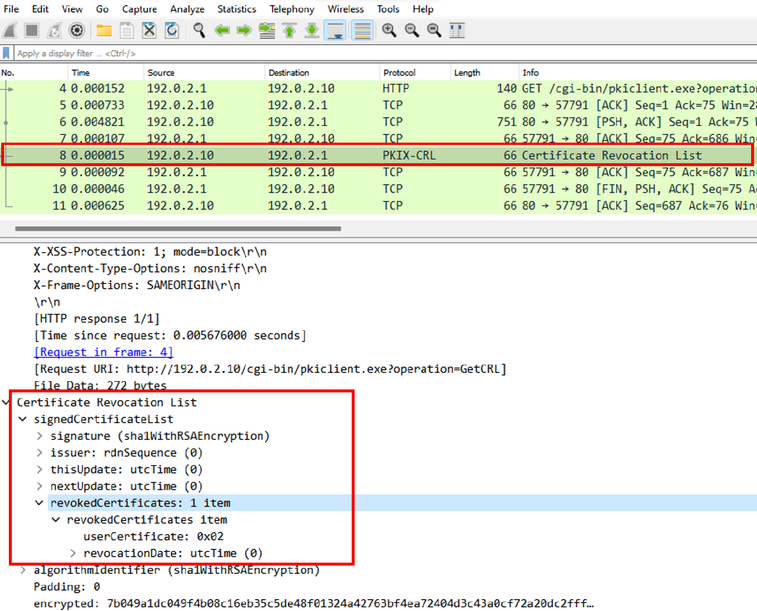
Dépannage
Ces commandes peuvent être utilisées afin d'identifier d'autres problèmes liés aux certificats :
- Sur le FTD :
debug crypto ca 14- Sur le routeur CA :
debug crypto pki API
debug crypto pki callbacks
debug crypto pki messages
debug crypto pki validation
debug crypto pki error
debug crypto pki server
debug crypto pki transactionsHistorique de révision
| Révision | Date de publication | Commentaires |
|---|---|---|
1.0 |
22-Jan-2024 |
Première publication |
Contribution d’experts de Cisco
- Angel Sanchez GarciaIngénieur TAC Cisco
Contacter Cisco
- Ouvrir un dossier d’assistance

- (Un contrat de service de Cisco est requis)
 Commentaires
Commentaires